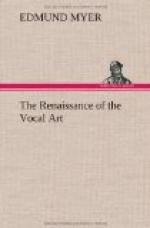EXORDIUM.
Man, to see far and clearly, must rise above his surroundings. To win great possessions, to master great truths, we must climb all the hills, all the mountains, which confront us. Unfortunately the vocal profession dwells too much upon the lowlands of tradition, or is buried too deep in the valleys of prejudice. Better things, however, will come. They must come. The current of the advanced thought, the higher thought, of this, the opening year of the twentieth century, will slowly but surely increase in power and influence, will slowly but surely broaden and deepen, until the light of reason breaks upon the vocal world. We may confidently look, in the near future, for the Renaissance of the Vocal Art.
PART FIRST.
EVOLUTION.
ARTICLE ONE.
The old Italian school of singing.
The Shibboleth, or trade cry, of the average modern vocal teacher is “The Old Italian School of Singing.” How much of value there is in this may be surmised when we stop to consider that of the many who claim to teach the true Old Italian method no two of them teach at all alike, unless they happen to be pupils of the same master.
A system, a method, or a theory is not true simply because it is old. It may be old and true; it may be old and false. It may be new and false; or, what is more important, it may be new and yet true; age alone cannot stamp it with the mark of truthfulness.
The truth is, we know but little of the Old Italian School of Singing. We do know, however, that the old Italians were an emotional and impulsive people. Their style of singing was the flexible, florid, coloratura style. This demanded freedom of action and emotional expression, which more largely than anything else accounts for their success.
The old Italians knew little or nothing of the science of voice as we know it to-day. They did know, however, the great fundamental principles of singing, which are freedom of form and action, spontaneity and naturalness. They studied Nature, and learned of her. Their style of singing, it is true, would be considered superficial at the present day, but it is generally conceded that they did make a few great singers. If the principles of the old school had not been changed or lost, if they had been retained and developed up to the present day, what a wonderful legacy the vocal profession might have inherited in this age, the beginning of the twentieth century. Adversity, however, develops art as well as individuality; hence the vocal art has much to expect in the future.
ARTICLE TWO.
The dark age of the vocal art.




